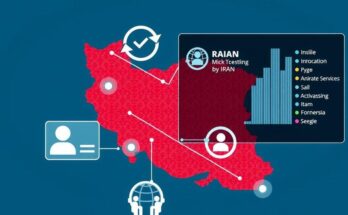Israel has launched extensive airstrikes against Houthi targets in Yemen while continuing its military campaign against Hezbollah in Lebanon. The strikes are part of a broader confrontation with Iran-aligned factions in the Middle East, significantly escalating regional tensions. Following Hezbollah leader Hassan Nasrallah’s assassination, casualties have surged, with over 1,000 reported deaths in Lebanon alone, raising urgent concerns about humanitarian impacts and calls for international intervention.
On Sunday, Israel escalated its military campaign by conducting extensive air strikes against Houthi positions in Yemen, coinciding with sustained operations against Hezbollah in Lebanon. This military action signifies an extension of Israel’s confrontation with Iran-aligned factions across the Middle East, amplifying concerns of an imminent broader regional conflict. The air assault on Yemen focused on the strategic port city of Hodeidah, where Israeli forces deployed multiple aircraft targeting fuel depots, power infrastructure, and docking facilities. This operation marks one of the most significant military engagements observed amid the ongoing turmoil in the region. According to Israeli military officials, these strikes were specifically directed at the Houthis, an Iran-supported militant group that exercises control over significant parts of Yemen. In response to actions purportedly against Israel, the Houthis have engaged in missile strikes directed at Israeli assets, including a recent ballistic missile that targeted the nation’s primary international airport. Israeli authorities articulated that the targeted infrastructures were pivotal for the Houthis to receive Iranian weaponry and logistics for military operations. They asserted that the Houthis have conducted attacks against Israel under Iranian guidance, seeking to destabilize the region and obstruct maritime navigation in the Red Sea. Witnesses in Hodeidah reported widespread power outages following the strikes. Simultaneously, military actions in Lebanon have intensified, following the assassination of Hassan Nasrallah, the Hezbollah leader, which occurred just two days prior. His death has compelled Hezbollah to acknowledge their vow to persist in hostilities against Israel, evidenced by continued rocket fire across the border. The ongoing conflict has led to a staggering casualty count, with over 1,000 fatalities reported in Lebanon since the conflict escalated last week. A specific attack on Ain Deleb resulted in 24 deaths, underscoring the devastation faced by civilians. The strikes, concentrated mostly in southern Lebanon, are part of a series of retaliatory exchanges that have characterized Israel-Hezbollah relations for nearly a year. Concerns for civilian safety have risen as thousands have been displaced, with estimates indicating over 200,000 people forced from their homes due to the escalating violence. Despite successful attacks and crucial military gains, international diplomatic efforts to broker a ceasefire have reportedly made little headway. High-ranking officials from various nations have voiced the necessity for immediate deescalation. Statements by White House officials suggest a belief that an all-out war with Hezbollah would be detrimental to regional safety and did not represent an effective resolution. As the situation remains precarious, the death of Nasrallah is viewed as a critical juncture within the wider context of Hezbollah’s regional role and Iranian influence. The ongoing violence is mirrored by the devastating impact on civilians, prompting voices of condemnation against military operations that overlook humanitarian considerations. Critics of Israel’s military responses, including the Pope, have pointed towards the ethical implications surrounding wartime conduct.
The Israeli military’s recent air strikes on Houthi targets in Yemen and continued offensive actions against Hezbollah in Lebanon form part of a broader strategy to counter Iranian influence in the region. The Houthis, who have maintained a hostile stance towards Israel and conducted strikes against its territories, are supported by Iran and have asserted their operational independence. Meanwhile, Hezbollah’s long-standing animosity towards Israel has been reignited following the assassination of its leader, Hassan Nasrallah, which represents a significant shift in the balance of power within the group. The ongoing conflicts in both Yemen and Lebanon are tokens of the wider geopolitical struggle involving Iran, its proxies, and Israel, who are engaged in a multifaceted confrontation that threatens to escalate into a larger regional war. Recent reports indicate that civilian casualties and displacements are climbing as the hostilities between these factions intensify, leading to urgent calls for international mediation and conflict resolution.
In summary, Israel’s military strikes against Houthi targets in Yemen and heightened operations against Hezbollah in Lebanon underscore a significant escalation in the region’s longstanding conflicts. These actions reflect Israel’s broader strategy of countering Iranian-backed militancy, though they also raise concerns about a potential widening of hostilities. The humanitarian impact of these military engagements is profound, with thousands displaced and a rising death toll. As international dialogue for a ceasefire continues amidst rising tensions, the prospects for peace remain uncertain, underscoring the complex dynamics at play during this critical period.
Original Source: www.theguardian.com




